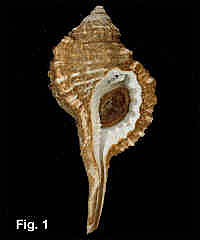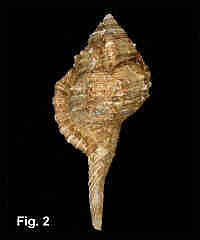

|
Cymatium
sinense (Reeve,
1844)
Description:
Shell sculptured with strong spiral ribs with intermediate riblets; 6 or
7 major ribs on the body whorl and 2 or 3 on each spire whorl, the first
2 or 3 on each whorl being bifid. Numerous axial ribs on spire whorls,
becoming strong nodules on the periphery of the body whorl. Later whorls
bear strong, high varices. Columella strongly lirate over its whole
length; outer lip with 7 or 8 strong bifid teeth internally. Anterior
canal long, either straight or curved. Colour white or fawn. Shell
covered with a thick, brown, sometimes hairy periostracum when alive.
Operculum oval.
Size:
Up to 77 mm, typically about 60 mm in length.
Distribution:
Throughout the tropical western Pacific, from Japan to Australia. In
Australia, as far south as Twofold Bay, NSW.
Habitat:
Taken in 30-200 m; uncommon.
Comparison:
Similar to Cymatium caudatum, which also occurs on northern NSW,
but differs by having a taller spire and lacking the deeply channelled
suture of C. caudatum.
Synonym:
Ranularia sinensis defrenata Iredale, 1936 is based on a type
specimen, probably subfossil, dredged from Sydney Harbour. It is broader
than the typical species, with a shorter spire and shorter canal.
Figs. 1,2: Off Tweed Heads, NSW, in 55 m (C.066505)
|